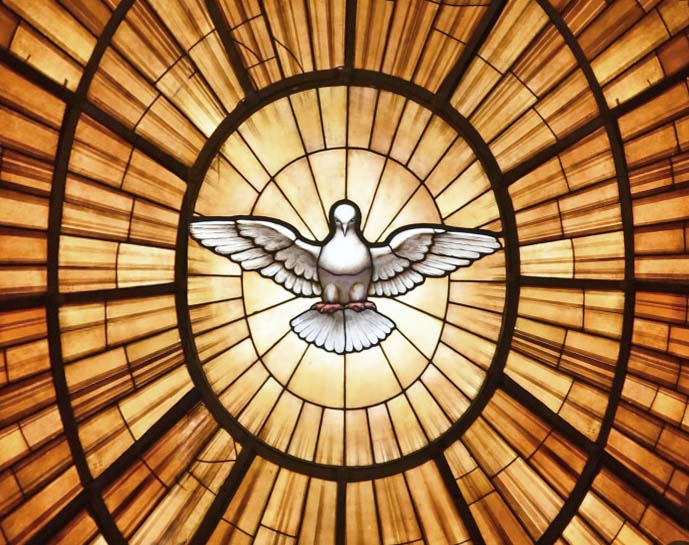The Meaning of Pentecost
At Pentecost we celebrate the coming of the Holy Spirit. The apostles were suddenly filled with a powerful, divine energy. That moment was made visible through ‘tongues of fire,’ small flames that appeared above their heads. These flames symbolize inner enlightenment, inspiration, and the courage to carry forth the message of love and truth.
The Holy Spirit is also often depicted as a dove. This dove symbolizes peaceful purity and divine inspiration. In the Christian tradition, the Holy Spirit represents the presence of God, the Absolute, working from within—not visible, but tangible as a silent force that helps people to understand, to forgive, and to live in truth.
We can also see the Spirit as the ultimate soul of the human being, that part of us which is eternal and continues to exist even after death. The Spirit is then experienced as something that touches our deepest core, something that helps us to recognize and follow our calling or life path.
Pentecost is therefore not only a Christian feast day that commemorates the outpouring of the Holy Spirit upon the apostles, fifty days after Easter. It is also a metaphor for receiving the ‘Holy Fire’ of spiritual growth—and for that we must remain open, otherwise nothing happens at all.
‘Pentecost’ comes from the Greek word pentakosta, which means fiftieth, since it takes place on the fiftieth day after Easter.
.
- Spiritual Awakening and Enlightenment
Pentecost is seen as a symbol of spiritual awakening and enlightenment. The outpouring of the Holy Spirit is interpreted as the moment when divine consciousness is breathed into humanity, leading to a higher level of spiritual insight and awareness.
In other words: “One begins to see, once one gets it” (J.C. the Third). - Inner Transformation
Esoterically, Pentecost is associated with inner transformation. Receiving the Holy Spirit symbolizes the transformation of the soul, through which higher spiritual truths and insights are obtained. It can be seen as a process of inner alchemy, where the lower aspects of the human being are transformed into higher spiritual qualities.
In other words: “The hope for humanity lies in the transformation of the individual.” (Jiddu Krishnamurti) - Unity and Universal Consciousness
The event in which the followers of Jesus were able to speak and communicate in different languages is a metaphor for universal consciousness and unity. It points to the ability to look beyond the limitations of individual differences and to recognize the underlying unity of all people and all things.
In other words: One truly begins to *listen* beyond all words and connotations of different cultures. - Receiving Wisdom and Knowledge
The Holy Spirit is regarded as a source of divine wisdom and knowledge. Receiving the Spirit can be seen as the opening of the inner senses to higher knowledge and intuitive insights. It emphasizes the importance of inner wisdom and spiritual knowledge in our lives.
In other words: One opens all subtle senses and capacities of intelligence. - Cosmic Energy and Life Force
In esoteric traditions, the Holy Spirit is associated with cosmic energy or prana, the universal life energy. Pentecost is the moment when this life energy is powerfully infused into human consciousness, leading to spiritual strength and vitality.
In other words: One realizes that life is a celebration of growth to which everyone is invited! - The Path of Initiation
Pentecost can be seen as a step on the path of initiation, where a person reaches a higher level of spiritual development and awareness. Receiving the Holy Spirit can be understood as an initiation into higher mysteries and spiritual truths.
In other words: One truly realizes that inner study must begin, or be elevated to a higher level.

You might think: what does that church festival have to do with us… with peace, with demonstrations, with the struggle against war, against injustice, against lies and deceit?
But let me tell you this: Pentecost is the feast of inner liberation. Not of belief as a system, but of Spirit as spiritual power.
In the old stories it is told that the Spirit descended. Like a gust of wind, like flames, like a whisper of truth in the heart of humankind. Not upon one person, not upon a holy elite, but upon all who were willing to listen. Upon all who let go of their fear and began to speak their truth.
There is a source of fire within us that does not burn, but illuminates. There is a power that needs no violence to change the world, because it speaks from within: through love, through clarity, and through courage.
There are many demonstrations for peace… in cities, on streets, at institutional buildings, in silence or in words, with drums or banners.
But true peace does not begin with politics. Not with treaties. Not with ‘weapons down’…
Peace begins with a purified mind… Spirit!
Peace begins with people who allow themselves to be inspired, no longer by hate or ideology, but by something much deeper:
By Spirit that is peace, that is truth, that is wisdom.
The dove of Pentecost, but also that of the peace movement, is not a mere symbol of well-meaning hope. It is the inspiring image of a human being who has awakened. Of every person who says:
“I am not powerless. I am a bearer of light”
“I am not alone. I am part of a greater fire that will now speak upon the earth”
That is why Pentecost belongs to the peacemakers and the seekers of truth. To everyone who does not only demand peace from the world, but chooses to embody it in word and deed.
Not tomorrow
Now
Every day anew


